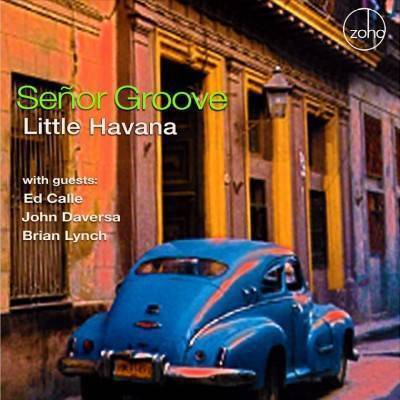Senor Groove Little Havana
Senor Groove
Little Havana
Zoho
Senor Groove is a the latest band from the Smith brothers, bassist Tim and guitarist Roddy, who are flanked by Mercelo Perez (drums), Martin Bejerano (piano), and Murph Aucamp (percussion). For this session that focuses on the Cuban neighborhood in Miami named Little Havana, the quintet is augmented with a wide array of guests, among them recent Grammy winner John Daversa (EWI), Ed Calle (sax) and Brian Lynch (trumpet) – all superb Latin players with roots in Miami.
The Smith brothers, in their Mr. Groove Band incarnation, backed Bonnie Bramlett on her Roots, Blues and Jazz LP, Boots Randolph’s A Whole New Ballgame, Rocket 88 – Tribute to Ike Turner, and Tribute to JJ Cale, all on the Zoho label. Tim Smith is now an educator at University of Miami’s famed Frost School of Music and his brother, Roddy, is a versatile guitarist based in Nashville.
The Little Havana neighborhood with its Cuban food, thriving music scene, and rather timeless character in a historical sense, has made quite an impressive on Tim Smith who leads this session in capturing the feeling of the place. As he says, “I hope this record gives you this sensation. Roll down your windows, go west on Calle Ocho. Put some jazz or rock on your radio, and let the worlds collide.”
There are seven tunes, percolating with percussion, soaring horns, and bright, upbeat arrangements. It begins with “3.5 x 2,” a reference to the 7/4 time signature. Roddy and Tim carry the melody along with guest Tom Kelly on sax. Roddy delivers a classy solo, followed by Kelly and Bejerano. “Drume Negrita” is a traditional Cuban lullaby featuring the expressive Spanish vocals of Roxana Amed against a backdrop of strings and punctuated by Tim Gordon’s flute solo.
The title track is emblematic of the band name with its salacious groove and dialogue between Tim’s bass and Gordon’s flute. There could be some symbolism in the exchange between high and low registers as Little Havana took in the desperate refugees, only to see itself now as a proud bastion of Cuban strength, not only in Miami but in the U.S. David Sneider might represent the upward mobility with his ascending trumpet solo. The rather unpredictable improvisational passage toward the end is referred to in Cuban music as ‘montuno.’
“Lellarap” was inspired by Time taking John Daversa’s composition course where the assignment was to incorporate parallel harmony. It spotlights both Tim on bass and an explosive drum solo from Perez. “Linville Falls,” rather curiously is a bluegrass tune, transformed here into a briskly paced tune where trumpeter Brian Lynch doubles the melody with Ed Calle lyrical sax. They keep pushing until Bejerano enters with his own statement. Lynch has done considerable work with maestro Eddie Palmieri and his take on this tune is its main engine.
“Second Time Around’ diverts from the previous in that it features synthesizers and electronics, elements that are very much central to today’s Little Havana musical gumbo. It’s John Daversa on the Electronic Wind Instrument who carries this one. The closer “C100” (in the key of C and 100 beats per minute) rather obviously showcases Aucamp on percussion as Gordon picks up the sax, playing to Tim’s bass rhythms.
The album has a sprightly, tight, enjoyable feel. Close your eyes and try to smell the coffee and those rich spicy aromas emanating from the cafes and restaurants. Of course, the music can’t create a total sensory experience but it’s a fine Latin jazz soundscape done in a smaller ensemble configuration than what we’re used to hearing from the larger Salsa bands. Arguably, the music presented is more varied too.
- Jim Hynes
Discover more from Making A Scene!
Subscribe to get the latest posts sent to your email.















































